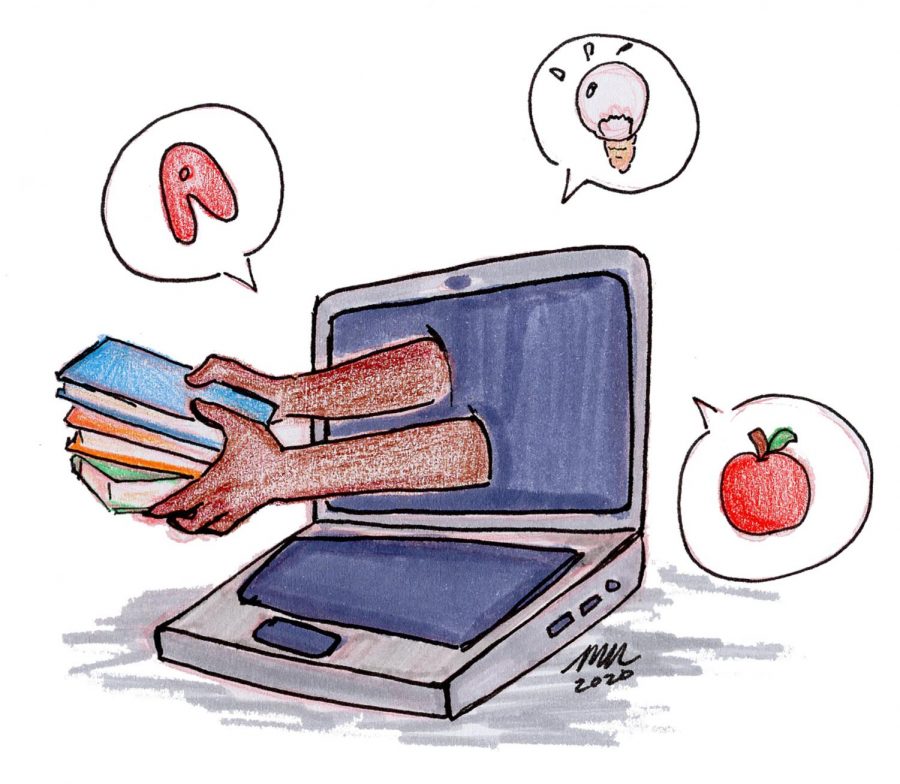Learning Behind the Screen
Some students are choosing the safer route and attending school virtually
October 12, 2020
STORY BY: Nadia May
Design Editor
The wave of COVID-19 brought in many safety precautions for students and teachers. One of those safe options is to take online school if they don’t feel comfortable taking classes in person.
Seniors Jasmine LeJeune and Emma Sharp are two students taking completely virtual classes. They both say online learning has its perks.
“At the moment, I do prefer taking online classes,” LeJeune said. “The management I have over the time I spend working on certain assignments helps motivate me a lot, especially since I’m able to take breaks in between classes to refresh, unlike the consecutive hours of attending in-person school.”
Although online school gives you a chance to work at your own pace, Sharp says she prefers to stick with a more traditional classroom environment for learning.
“I have been in virtual classes for about two or three weeks now and I’m really liking it,” Sharp said. “I think I have grown a lot more comfortable with virtual classes but I still prefer in-person classes because you are able to work directly with your teacher and you are able to see your friends.”
Students have to start working on getting used to the new way of learning virtually and forming habits that work efficiently from home. The amount of work might seem the same or a lot more than a normal classroom setting to some, but according to LeJeune, it depends on the student.
“I feel like the amount of effort you put into [online school] really depends on the person,” LeJeune said. “I could easily knock out my classes at home or if I was physically attending school, but some others might have more difficulty focusing on their work in their home environment if they’re easily distracted. On the other hand, they could work diligently in person since there’s less to be distracted by and more pressure to be tending to your classes if you’re actually at school.”
To Sharp, the work for online school doesn’t take as much time for her to complete compared to the work for in-person classes.
“Honestly, for me, I have to put less effort in, and that’s not because I have easy classes, but because all of the assignments are posted at once [and] I am able to complete a week’s worth of homework in about 45 minutes,” Sharp said. “I think virtual classes are easier because you are able to complete almost all of your assignments within 45 minutes. Also, your assignments don’t require as much work done on them as they would with in-person classes.”
Although online school might give students more flexibility with time management, there are some factors that might cause a student to struggle while learning.
“I find that the easiest thing about online classes is that you have the power to control when and where you work on assignments, given that you turn them in on time,” LeJeune said. “The most difficult would have to be the lack of immediate help you would be able to get from your teachers and others in your class if you were with them physically.”
Virtual schooling also means that students are able to work on assignments wherever they like, so the learning environment may be different for everyone.
“I sit at my desk in my room,” LeJeune said. “It’s quiet and away from everyone else so I have the ability to concentrate on my classes. Oftentimes my dog will lay on my lap while I work.”
While taking online classes, it’s important to set up an environment that allows one to focus on learning and completing assignments. Find a place where you won’t get disturbed, remove any distractions that are near you such as electronics and snacks, and choose to study in an area that’s not too comfortable for you to work efficiently.
“Isolate yourself from the people and/or things that are distracting you from your work,” LeJeune said. “I do leave my door open, but sometimes I’m required to close it if I want to work quietly depending on how loud my family is being. Other times, I place my phone and iPad further away from me or in a completely different room so I’m not drawn to look at notifications. I would also suggest listening to music — whether it’s wordless or not — to block out the background noises and direct yourself into focusing on what’s in front of you.”
It’s also important to figure out a schedule to complete assignments that works best for you. Breaks in between work are important, and its best to stay on task.
“I usually work for a while and take a couple of short breaks but nothing that makes me lose focus completely,” Sharp said.
Considering students have the option — or possibility of being quarantined — of taking online school, teachers at NHS have had to transition to teaching online, while also teaching in the classroom. William Dennis teaches both online and in-person Biology and Physical Science classes. When it comes to virtual or live teaching in a classroom, he prefers seated learning.
“I greatly prefer teaching live based on my desire to interact with my students,” Dennis said. “My live classes have a certain conversational flow that is not possible online. My students are constantly coming up with fantastic questions that I fold into my lessons. This is extremely difficult to do with online classes.”
Between teaching in-person and online, Dennis said they both have their differences and challenges.
“The hardest part of teaching on-line classes is that students are not necessarily working at the same rate, so lectures and Zoom meetings can be fairly impractical,” Dennis said. “The easiest part of online teaching is the 24/7 access and the instant responsiveness of communicating electronically.”
Teaching virtual and live classes has also caused Dennis to make an effort to balance classes and to be there for all students, whether they’re behind a screen or sitting in his classroom.
“Balance is a tricky idea and I don’t think I’ve mastered it yet,” Dennis said. “I put more effort into my live classes because of the performance aspect and I spend more time monitoring my online classes and responding to student inquiries.”
Online school may be a little difficult for some students because they are learning in an environment they aren’t familiar with. Dennis says that the best thing to do to stay on track is to minimize distractions, and to do your best to stay on task.
“I know that I have trouble retaining what I have read online, as my brain is spatially based and I tend to recall where things are on a specific page,” Dennis said. “Scrolling denies me that benefit. And I will also share an unpopular opinion: You do not actually multitask well. If a student is listening to music, has family moving about, and can hear a dog barking while they are trying to read for content, they are not going to be highly successful. There is a reason we make you be quiet during tests: The brain has a limited amount of focus.”






